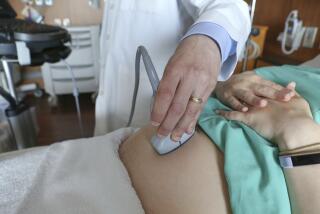Tarzana Lab to Lose Medi-Cal, Medicare for Cancer Tests
- Share via
Federal health authorities have decertified Central Pathology Services Medical Group--Southern California’s largest Pap smear laboratory--saying the Tarzana company has misdiagnosed too many specimens.
The Pap smear is a medical test regularly used by doctors to detect cervical cancer. Central Pathology processes about 2,600 Pap tests a day.
The company failed to diagnose cervical cancer or said the disease was present when it wasn’t in 45--or nearly 4%--of 1,200 specimens randomly selected by the federal Health Care Financing Administration, officials said.
“We consider those results to have very serious ramifications,” said Harry Barba, associate regional administrator for HCFA, a division of the Department of Health and Human Services. Nearly 7,000 women nationwide died of cervical cancer last year, according to the American Cancer Society.
2 Inspections Conducted
Two inspections of Central Pathology were conducted in January. The inspectors were members of the American Society of Cytotechnologists, a trade group.
The HCFA said decertification means that Medicare and Medi-Cal will no longer pay for Pap smears processed at Central Pathology. “This company no longer qualifies to participate in our programs,” Barba said.
Central Pathology spokesman Martin Cooper said the company will appeal the agency’s decision.
“We took the same 45 cases to an independent lab, and their results differed from those of HCFA,” Cooper said. “This is a very subjective business. This is not a black-and-white issue. You cannot look at a medical slide and say with 100% certainty what you see is A or B.”
Medicare and Medi-Cal account for about 10% of Central Pathology’s business, Cooper said. The remaining 90% is paid by private insurance companies, he said.
Barba said Central Pathology is one of more than 15 medical labs nationwide undergoing inspections because of growing public concern nationwide about the practices of Pap smear labs.
Number of Specimens
The number of specimens that cytotechnologists are expected to review is at the center of the concern.
In some labs, sometimes called Pap mills, technologists read four times as many specimens as medical experts recommend to ensure accuracy. Some companies pay technologists on a per-specimen basis, which can encourage carelessness, health officials said.
Central Pathology said its technologists average 81 slides a day. But it could not be immediately determined how that compares with industry standards.
Some studies suggest that technologists miss one of every four cases of cervical cancer. Experts say thousands of women have died of the disease after Pap smears indicated that their cervices were free of cancer.
More to Read
Sign up for Essential California
The most important California stories and recommendations in your inbox every morning.
You may occasionally receive promotional content from the Los Angeles Times.













